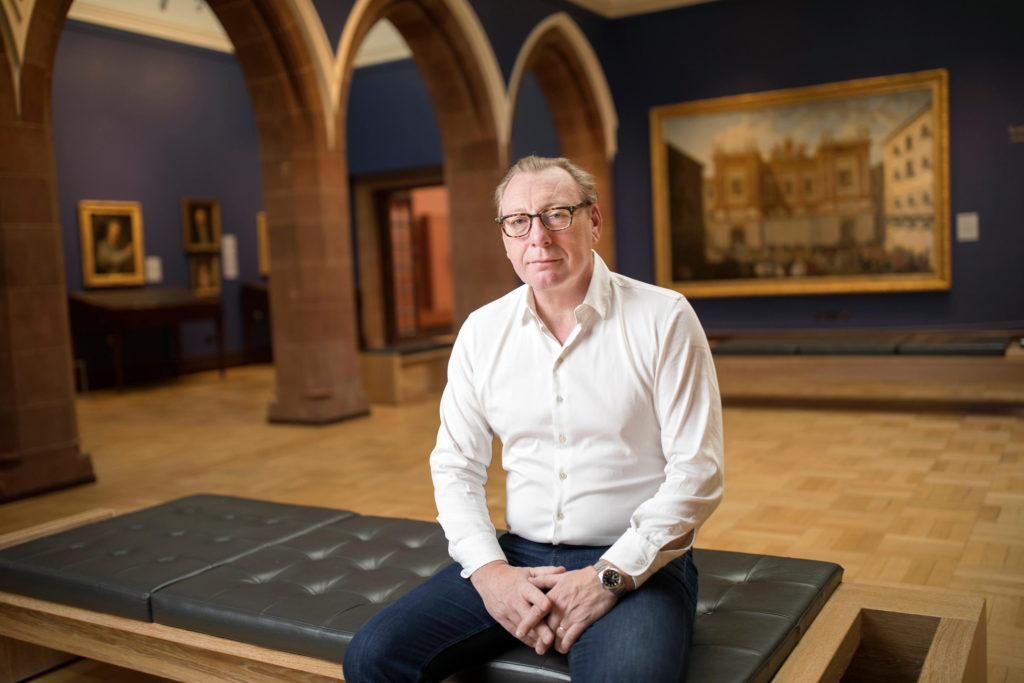
We were delighted to have the chance to talk to Benny Higgins and hear about his self-identified chameleon-like approach to his differing non-executive roles. As he emerges from a very successful and high profile career in financial services, most recently as inaugural CEO of Tesco Bank, Benny’s non-executive portfolio now encompasses public, not-for-profit and commercial organisations.
Looking particularly at your non-executive career, can you share why you have chosen the roles that you have?
I feel very lucky to be in the roles that I am today. Almost irrespective of which sector I am involved in – public, private or government – I look for the same characteristics. These are: is it a business or enterprise to be proud of; is it an organisation, sector or cause I have some interest in; and do I feel that I can contribute to it positively. I also need to be convinced that the values of the organisation are good and realistic and ultimately that the people involved are those that I want to, and can, work with.
Reflecting on your own experience, how do you know that you have made the right decision in joining an organisation’s board?
In my senior executive experience as Chief Executive of Tesco Bank for ten years, and before that Chief Executive of HBOS Retail, I was on boards and subsidiary boards. I was also the Chairman at Sainsbury’s Bank before I became the Chief Executive of Tesco Bank, so my perspective is fairly broad.
In both my experience and in my opinion, there are good NEDs and less good ones. The ones that are least effective are the ones that are there more for the kudos and their own agenda than to make a contribution to the business. Unfortunately, this isn’t uncommon behaviour: you often find there are NEDs who are there in the hope of catching somebody out or making speeches about something to do with themselves.
As it happens, at the moment everything that I am involved in is run by great people. I judge each enterprise I am involved with, no matter what sector or geography, and I take it as seriously as I would if it was a commercial business. The organisations with whom I am currently working all involve good people with many excellent values and those are the essential characteristics I always search for to really judge if I made the right decision.
To chair different types of organisations requires you to be sufficiently chameleon-like to adapt to the precise circumstances of their focus or purpose. I chair organisations where people give their time voluntarily and I also chair organisations where people are being remunerated and I think there are subtleties about how you manage the differences. Fundamentally though it’s always about being very outcome oriented. But the manner of success matters too.
Your career has largely been in the private sector, and primarily financial services. Some of the new non-executive roles you’ve taken on have moved into public sector and arts and culture. How can your experience benefit these organisations?
Over a reasonably long career, and particularly in financial services, I have been responsible for running large complex organisations. I had over 30,000 people in the business at RBS and over 40,000 at HBoS. I had to create an organisation at Tesco Bank from scratch, starting from nothing and establishing the right values and strategic process to make it a success. All of these things just add layers of experience.
During my last three years as Chief Executive at Tesco Bank I was also the Group Strategy Director for Tesco which looked at strategy right across the group. I was also on the Executive Committee helping coordinate the group’s 500,000 colleagues in the UK and across the world. I think that was a period that really helped sharpen my strategic focus. Food retailing is a very unforgiving sector; if you get it wrong it doesn’t take long for it to show through. I learned more about customers over that period with Tesco than I had in the whole of my career to that point. I was quite protected from that in financial services where most customers see themselves as receiving a similar service.
I have spent a large part of my career dealing with complexity, which I think is really useful experience, regardless of sector. I have also dealt with crises, transformation and big acquisitions, and these all add layers of experience.
When I was starting out as a young actuary in Standard Life, Ian Lumsden who was the finance director said to me: “if you think you are smart, there is a danger that you think you can solve any problem. Actually problems are often solved by having the experience of encountering them before”. Essentially, you learn more in defeat than you do in victory. It is a cliché, but it really is true.
From my work in financial services I know what it is like to be very heavily regulated. Whilst it is criticised by many, more often than not the purpose of regulation is wise. Sometimes its execution can be a bit clumsy, but at the heart its intentions are generally good.

You have been tasked with setting up the Scottish National Investment Bank on behalf of the Scottish Government. When putting the board together how have you approached finding the right balance of skills and experience needed?
I delivered the implementation plan for the new Scottish National Investment Bank on my last day of being at Tesco – 28 February 2018 – and I was subsequently asked to be the adviser to the First Minister of Scotland to deliver the project. In doing so, I had to acknowledge that I forfeited being part of it when it was up and running. There was absolute transparency on that from the very beginning, although of course I could have decided that I didn’t want to be involved at that point and equally I could have put my hat in the ring to be the first Chair. It seemed to me, however, that the need to get involved at that initial point was greater and I have no reservations or misgivings about having done so.
I have been working closely alongside the Project Director and that team to develop a framework for the bank and building it as such, rather than focusing on building the Board. I have spent a lot of time consulting at large and recently we hosted several breakfasts across the country to talk about what we are doing with the bank. I have been very active beyond that, speaking at conferences and meeting with other national banks to understand the lessons learned previously.
The advert for the Chair of the Board closed in August, and I will be involved in choosing that person as Chair of the selection panel alongside Dame Susan Rice, Sir Anton Muscatelli and Liz Ditchburn. I may not be involved much beyond that, so it will be the role of the Chair of the Board to take over from then to move the rest of the Board and other appointments forward. It is anticipated that the recommendations for the appointment of the Chair will be received and approved by the Scottish Government by October. From there, the process of recruiting for the Chief Executive will begin – which is a very big appointment – and in due course other members of the Board.
We weren’t looking specifically for Scottish candidates for the Chair: it was largely about the right attitude, appetite and experience to do the job. The right person will have a somewhat vocational attitude towards this and it needs to be someone who cares about doing a good job for Scotland. It is going to be a very historic appointment: to be the first chair of the Scottish Investment Bank – an institution that I hope is around for hundreds of years – will be quite something.
In your opinion, what is a board’s role in shaping the strategy of an organisation? Should this differ across private and public sectors?
I think the role of Chair of the Board is to have confidence that the executive team is the right team. Particularly they need to have confidence that the most senior member of the Executive team – the Chief Executive – is the right person for the job and that the strategic guiderails they put together are the right ones. Having been a Chief Executive, I think the primary responsibility for developing strategy lies with the Executive team. It is the responsibility, in my opinion, of the Chair to be comfortable that that strategy is being followed in a disciplined and systematic manner. They must assume responsibility of that strategy by accepting or amending the recommendations from the Executive team.
It is the executives who are involved working in the organisation every day and they are therefore best equipped to develop strategy. A good board will challenge and give them food for thought, but will also support them. A good Chair will support the Chief Executive in doing the job well, but ultimately the responsibility of developing a recommendation on strategy should lie in the hands of the executive. Likewise, the board should be comfortable that the values of the organisation are the right ones and that they are being adhered to. Speaking from the perspective of a Chief Executive, I felt strategy was always my ultimate responsibility and that it was my role to ensure my board could be reassured that we were doing things properly and bringing forward strategic plans.
It is important to think about the purpose of a strategy. A strategy is in essence a vision for how an organisation will be different from how it is today.
To do this requires going back to the first principle of the organisation’s purpose. You then need to explore the vision in a depth that makes sense in the context of the organisation. From there, and you can determine the strategic drivers – perhaps a total of five or six – before you can establish the organisation’s values. These will help to characterise it and how it will operate. I think the best values are modestly put but aspirational and written in sufficiently simple language that everyone can understand and remember them.
It is important to recognise that strategies are not operational plans – too often you see huge documents that claim to be strategic plans, which are in fact the operational plans that should then be judged against a strategic framework. The strategic plans should really be written on one piece of paper and ultimately measurable against values.
You need to be able to sit around the board table and ask if something is consistent with the values. If the value is, for example, to be world class at something, that isn’t going to help you test anything. If the value is that you are going to do the best for your customer or care about the communities in which you operate then that can actually be assessed. The values have to be used. They can’t be put in a drawer and stay there.
How much influence does, or should, a board have in making sure an organisation is high performing?
Performance is about making sure that an organisation is measuring the right things. I think that the board has to be confident that the performance objectives are realistic but demanding, and that the measures are the right ones.
What is required to ensure a successful executive / non-executive relationship?
I think it is the same in any relationship with any two people in any walk of life: respect and trust. I treat every person I encounter with the same objective of seeking to make sure there is mutual respect and trust. It is not about popularity, but I think respect and trust lies at the heart of it.

When and where should an independent non-executive display independence on a board?
They should always be acting independently; they are there to always display their own opinion. There has to be a recognition that everyone is on the same team trying to do the same thing. In my career, whether it be as a non-executive or executive, I have always ensured that I frame and form my own opinions based on the facts before me.
There are of course times when having expressed an opinion you need to accept that the nature of the issue is one where the majority has spoken and you are not part of that and you therefore need to fall in line. That is more likely to be true than not true as there is often more than one answer to a problem, opportunity or issue. Of course, there are also the situations where you might have genuine concerns that an issue goes against the values or is counter-productive for an organisation and that it would impact on the integrity. That is a different situation and you can’t fall into line then.
It is very important to have diversity of thought however. It brings a considerable strength to all teams and makes it achieve more.
How innovative and forward thinking do you consider the approach to governance to be in Scotland and the UK more widely?
My experience in Scotland has been very positive. I have grown up in the very highly governed environment of financial services. If I look across the wide range of activities that I am involved in on any boards today, there isn’t anywhere where I would describe the governance as anything other than strong.
Good strong governance is a hygiene factor and for me is not optional.
Do you have future ambitions for board work that you would mind sharing with us?
As is evident with the portfolio I am engaged with today, variety is something I find both interesting and very helpful. It is quite remarkable even in the diverse range of businesses, enterprises and organisations doing very different things that I find myself with loads of connections, whether it be the people I speak to about one subject becoming relevant in the context of another, or issues that I am involved in with one entity helping me support a solution with another.
I do like variety and I am intrigued by doing different things and where I have the opportunity to make a difference. At this stage that might be something with an international focus or remit. I am very interested in education, and I am a visiting professor at four universities – Glasgow, Edinburgh, Heriot Watt and Strathclyde – lecturing in areas such as finance, or more recently the connection between arts and leadership, as two areas of interest in my life.
We will see what comes next.
Benny Higgins – Biography
Benny began his career at Standard Life in 1983 where he joined as an actuarial student and went on to become a member of the Standard Life Group Executive Committee in 1996. In 1997 he moved to RBS to become Chief Executive of Retail Banking. He was with RBS until 2005, during which time he led the successful integration of NatWest Retail Banking – one of the largest hostile takeovers ever undertaken in banking. He became Chief Executive, Retail, HBOS in 2006 before joining Tesco Bank as Chief Executive in 2008, a position he held until February 2018.
In September 2017 Benny was asked by the Scottish Government to develop an implementation plan for the creation of a Scottish National Investment Bank. Subsequently he was appointed as Strategic Adviser to the First Minister on the building of the Scottish national Investment Bank.
Benny is Executive Chairman of the Buccleuch Group, Chairman of the National Galleries of Scotland, Chairman of Sistema Scotland, Chairman of Forster Chase Advisory Limited, Non Executive Director of Glasgow Life, Trustee of Burrell Renaissance, Non Executive Director of Arabian Centres, Chairman of Kyckr and Commissioner of Infrastructure Commission of Scotland.
Benny graduated with a First Class Honours degree in Mathematics from the University of Glasgow and he was awarded a University Blue in 1983. He is a Fellow of the Faculty of Actuaries, a Fellow of the Chartered Institute of Bankers in Scotland, and a Fellow of the Royal Society of Edinburgh. He is an Honorary Professor at the University of Glasgow, Honorary Professor at Edinburgh University, Visiting Professor at Strathclyde University, Honorary Professor at Edinburgh Business School, Heriot-Watt University and Doctor of University, University of Glasgow.